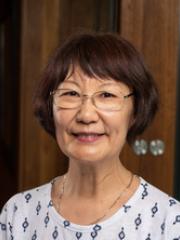
Research interests
Dr Jun Yan is a molecular biologist. She completed her postgraduate study at The University of Queensland. After which she undertook a postdoctoral position in Experimental Oncology laboratory in Department of Pathology, The University of Queensland and worked on Ras / Raf signalling pathway. In 2001 she joined the Neuroimmunology Research group in Department of Medicine, The University of Queensland and works on an autoimmune disease multiple sclerosis (MS), ischaemic stroke and amyotrophic lateral sclerosis (ALS) . She has been investigating NF-kB signal transduction pathway in neurological diseases.
Dr Yan is currently working in the field of multiple sclerosis research, motor neurone disease and ischaemic stroke. Dr Yan's research interests are primarily investigating the mechanisms involved in disease development, diagnosis and treatment diseases.
Dr Yan’s research area on MS focuses on exploring the NF-kB signal transduction pathway in the development of the disease. MS is a chronic inflammatory, demyelinating and neurodegenerative disorder of the central nervous system (CNS). It is considered to be an autoimmune disease mediated primarily by CD4+ T cells, which are activated in the peripheral blood and migrate into the CNS. The molecular basis of MS pathogenesis is not clear. Recent studies have shown that a transcription factor, NF-kB, plays important role in autoimmune diseases progression and is involved in the activation of lymphocytes.
NF-kB is a ubiquitous transcription factor that plays an important role in controlling gene expression in inflammation, immunity, cell proliferation and apoptosis, and therefore we would like to know what role NF-kB plays in MS. In mammals, NF-kB comprises a family of five protein subunits, p50, p52, RelA (p65), c-Rel, and Rel-B. In most resting cells, hetero- or homo- dimers of NF-kB subunits are retained in an inactive form in the cytoplasm through association with an inhibitory protein, called IkB. Exposure of cells to a variety of stimuli leads to the rapid phosphorylation, ubiquitination, and ultimately proteolytic degradation of IkB, which frees NF-kB to translocate to the nucleus and initiate gene transcription. Dr Yan’s research projects are to determine if this pathway is dysregulated or impacted upon in MS.
Methodology in my studies:
- Flow cytometry
- T cell proliferation assays
- Western blots
- Immunocytochemistry
- DNA sequencing
- Tissue culture
- Luciferase assays
- DNA MicroArrays
Funding acknowledgement
MS Research Australia
Potential Honours Projects and Summer research scholarships:
To investigate if NF-kB is constitutively activated in different immune cell types from MS patients compared to healthy controls.
To investigate if mutations in NF-kB regulatory molecules correlate with MS.
To investigate NFKBIA promoter function in MS using in vitro luciferase assay.
